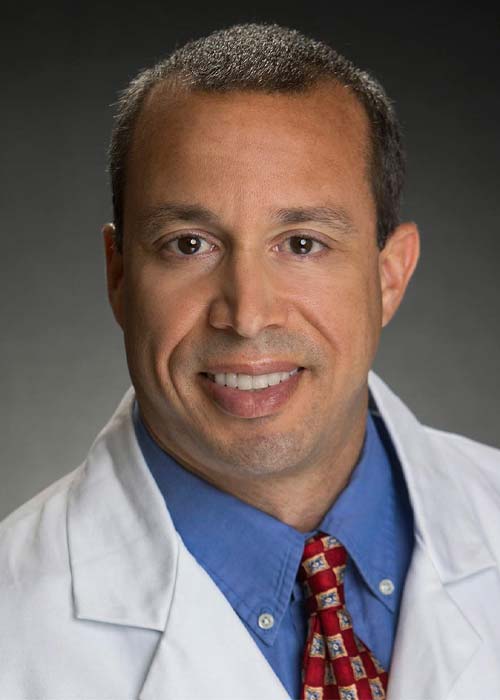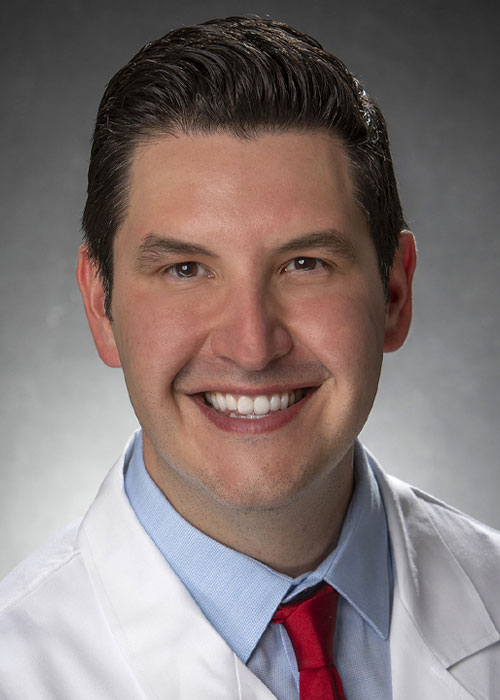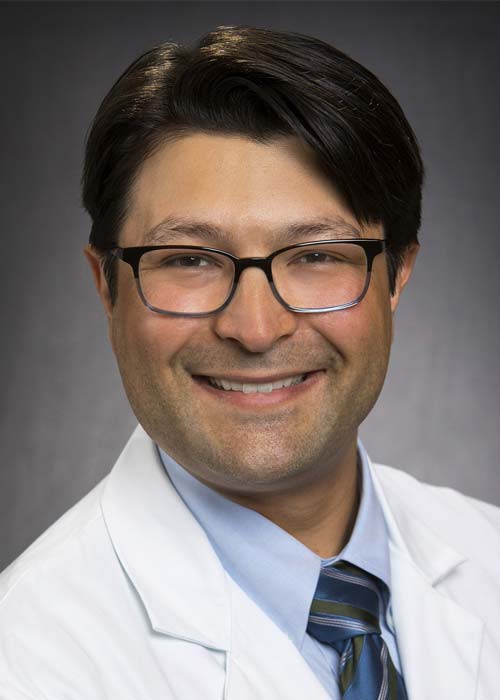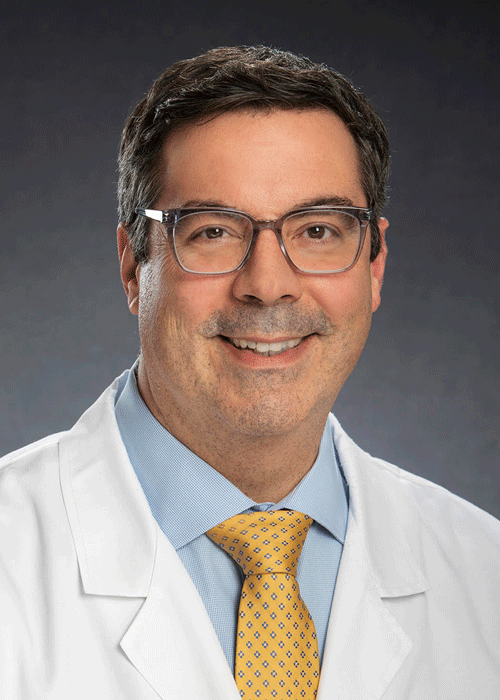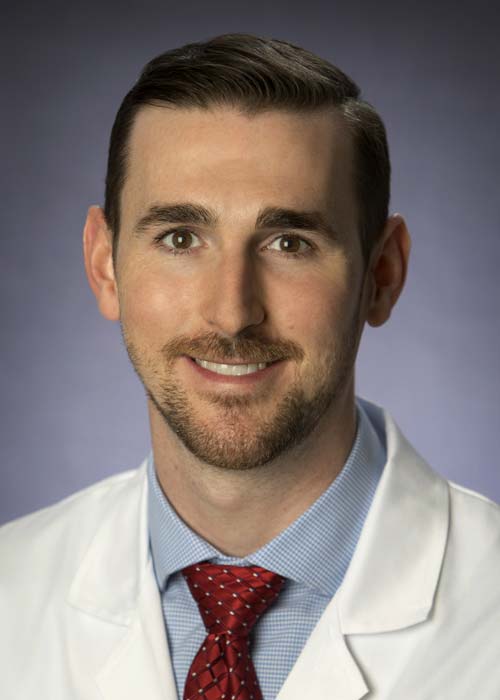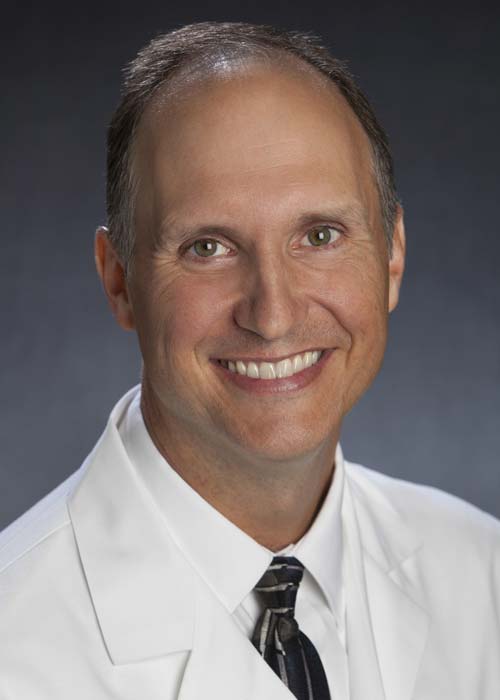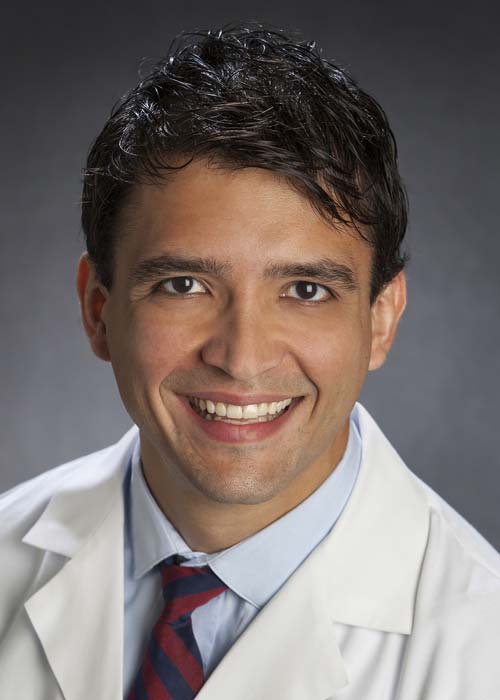Prostate Cancer
Prostate cancer affects one in six men during their lifetime. It’s the second most common cancer diagnosed in American men – more common than breast cancer is among women.
Knowing the facts about prostate cancer will help you make informed choices about screening and treatment.
Most men who learn they have prostate cancer are surprised. This is because, when caught early, prostate cancer does not cause symptoms. Symptoms can develop as prostate cancer grows and spreads. These many include:
- Problems urinating
- Trouble with erections
- Trouble urinating
- Blood in your urine or semen
- Frequent pain in your lower back, hips or upper thighs
If you’re experiencing these symptoms, don’t panic. These symptoms similar to those caused by other noncancerous prostate problems such asenlarged prostate and prostatitis. Your doctor will evaluate you to determine the cause of your symptoms.
Your risk of developing prostate cancer may be higher because of:
- Age: The disease is rare before age 40. It is most common in men over age 65.
- Race: African-Americans are twice as likely to develop prostate cancer as Caucasians
- Family History: Prostate cancer runs in families. Men with a blood relative who has the disease have double the risk of having prostate cancer themselves.
- Weight and Diet: Men who are overweight may be more likely to develop prostate cancer. Studies also suggest that eating a lot of read meat and high fat foods increases your risk for prostate cancer.
Prostate cancer screening consists of two parts.
- PSA Blood Test: A small amount of blood is drawn from your arm and sent to a laboratory to detect the level of Prostate Specific Antigen that is present. Generally, the higher the PSA level, the more likely it is that you have prostate cancer, but other noncancerous conditions can increase your PSA.
- Rectal Exam: A doctor inserts a gloved and lubricated finger into the rectum to feel the prostate gland. The doctor is checking for any abnormalities that may indicate prostate cancer. The rectal exam is very quick, only 5 or 7 seconds.
Do I Need Both Tests?
It is possible to have an abnormal rectal exam and a normal PSA score or a normal rectal exam and abnormal rectal exam and have prostate cancer. Taking both the PSA and rectal exam together offers the best chances for detecting prostate cancer early.
What Is A Normal Result?
There is no standard score or result from a prostate screening that indicates prostate cancer. What is considered normal for each man varies based on his age and other factors. Your urologist will use his or her expertise to interpret your results. If your results indicate an increased likelihood of prostate cancer, your urologist will recommend more conclusive testing.
Prostate cancer is diagnosed with a biopsy. A small sample of tissue is taken and examined under a microscope to look for cancer cells. Fusion biopsy is an advanced technique that combines MRI imaging and ultrasound to target specific areas of the prostate. This allows for better precision and a more accurate diagnosis.
When Should I Be Screened and How
Urology San Antonio recommends the following screening guidelines:
| Age |
Screening Recommendation
|
|---|---|
| Under 40 | Not recommended |
| 40 – 49 | Recommended at least once in 40s to determine baseline; frequency determined by your doctor based on your results and risk factors |
| 50-69 | Recommended yearly unless your doctor suggests a different frequency |
| 70+ | Recommended for men with 10+ years of life expectancy; frequency determined by your doctor Not recommended for men with less than 10 years of life expectancy |
Using your prostate biopsy tissue, your prostate biopsy doctor can determine your cancer’s grade and stage. He or she may also order additional tests to better understand the type of prostate cancer your have and how likely it is to spread.
This information can guide you and your doctor in determining treatment options or whether a wait-and-see approach is appropriate.
Prostate Cancer Grade
Your cancer’s grade (referred to as a Gleason Score) tells your doctor about the cancerous tissue and how likely it is to grow and spread. Gleason Scores range from 2 to 10. Usually tumors with higher grades grow faster and are more likely to spread.
- Gleason 2 – 4: Low likelihood of cancer growing and spreading
- Gleason 5 -7: Intermediate likelihood of cancer growing and spreading
- Gleason 8 -10: High likelihood of cancer growing and spreading
Prostate Cancer Grade
After you know how aggressive your cancer is, your urologist needs to find out how much it has spread and where. To do this, your doctor will do a series of scans and also take into account the results of your PSA test and your cancer’s grade. In general, there are four stages of prostate cancer:
- Stage 1 or T1: The cancer is only in your prostate
- Stage 2 or T2: The cancer is still in your prostate but is more advanced
- Stage 3 or T3: The cancer has spread outside your prostate to nearby tissues like the seminal vesicles but hasn’t spread to your lymph nodes
- Stage 4 or T4: The cancer has spread to other parts of your body. It may be in your lymph nodes, bones and other organs like your bladder
Supplemental Tests
In the last few years, new laboratory tests have been developed to help your urologist assess the likelihood of your cancer being or becoming aggressive. These tests include PHI, OPKO, ConfirmMDX, Prolaris, Oncotype Dx, and Decipher. Ask your urologist for more information about these tests.
Prostate Cancer Treatment Options
If you’ve been diagnosed with prostate cancer, you have lots of questions and may feel overwhelmed by all of the treatment options. We’ll help you understand the risks and benefits of each option so that you can make an informed choice.
In general, the prostate cancer treatment options you consider will depend on your age, cancer grade, cancer stage, symptoms, and your general health. You’ll also want to consider how well each treatment option will work and how you may be affected by side effects.
Urology San Antonio offers prostate cancer second opinions, so you can be sure you are making the best treatment choices.
Prostate cancer does not always require immediate treatment. Active surveillance is a reasonable approach for men who have early-stage prostate cancer that’s growing slowly or who are older and have other health concerns.
Active surveillance means you follow a protocol of regular appointments with your urologist to monitor your tumor for changes. If your cancer’s behavior changes, your urologist may recommend moving from active surveillance to treatment.
Urology San Antonio doctors use a standardized active surveillance protocol, based on the latest proven research to ensure, that ensures key tests are offered and any changes in the cancer’s behavior are caught in time to trigger the next step in the surveillance protocol.
Radiation therapy is a common and highly effective treatment options for early-stage prostate cancer. It uses high-energy x-rays to kill cancerous cells in the prostate. There are two types of radiation therapy.
- External Beam Radiation Therapy: A computer-controlled radiation delivery machine called a linear accelerator to deliver precise radiation doses to the tumor while the patient reclines on a treatment table. External beam radiation is sometimes used after surgery to kill any cancer cells that may remain. This approach is called combination therapy.
- SBRT (Stereotactic Body Radiation Therapy) is a precise method of external beam radiation therapy. A powerful beam of radiation targets the prostate, and requires about 5 sessions lasting only a couple of minutes. Urology San Antonio offers SBRT at the San Antonio Cancer Center.
- IMRT (Intensity Modulated Radiation Therapy) is another type of external beam radiation therapy, which uses a lower intensity beam than SBRT. For prostate cancer, IMRT treatment plans usually include 45 daily treatments, with each treatment lasting only a few moments. Urology San Antonio offers IMRT at the San Antonio Cancer Center.
- NEW: Complete Guide to Radiation Therapy for Prostate Cancer
- Brachytherapy: Delivers radiation through radioactive pellets that are inserting into the prostate by a radiation oncologist during an out-patient operation.
- Xofigo (radium 223) – When infused into the body, radium 223 settles in the bones and radiates the cancer cells concentrated there, killing the cancer from inside the bone with limited damage to surrounding tissue. Xofigo is given monthly for six months through an IV infusion by a radiation oncologist.
Surgery to remove your cancerous prostate and the surrounding lymph nodes is called a radical prostatectomy. It is one of the most commonly used treatment options for prostate cancer that is confined to the organ, and it is highly effective.
At Urology San Antonio, our surgeons use minimally-invasive robotic technology that requires 5 dime-sized incisions rather than a traditional 6-8 inch incision. Patients usually recover within 2-3 weeks.
New Resource: Comprehensive guide to Prostatectomy
Robotic Technology
With robotic surgery, your surgeon sits at a console a few feet away from the operating room table, and he or she manipulates tiny instruments at the end of probes that have been inserted into your abdomen. The surgeon’s console screen provides 3-D, high definition view of the operating field at 10x magnification, which helps him or her see clearly in the small pelvic space. Additionally, the robot technology scales down the surgeon’s hand movements and filters out any unsteadiness, allowing for finer control inside the pelvic cavity and potentially better results for sparing the nerves involved in erections.
Nerve-Sparing Procedure
The nerves that control erectile function run along the edge of the prostate. Oftentimes your surgeon must cut through the nerves to remove the cancer. Whenever possible, your surgeon cuts around the nerves or carefully peels them away the prostate to minimize the effect on your erections.
Robotic Surgeons
Hormone therapy works by cutting off the supply of male hormones such as testosterone that encourage prostate cancer to grow. It targets cancer that has spread beyond the prostate gland and is thus beyond the reach of local treatments such as surgery or radiation therapy.
Although hormonal therapy cannot cure, it will usually shrink or halt prostate cancer, often for years. If prostate cancer stops responding to primary hormone therapy, secondary hormone therapy may be appropriate.
Different forms of hormone therapy work in different ways to stop testosterone. Some work by lowering the levels of testosterone; others block receptor cells for those hormones.
Hormonal control can be achieved with oral or injectable medications (medical castration) or through a surgery to remove the testicles known as an orchiectomy (surgical castration).
Surgery to remove the testicles (orchiectomy or surgical castration) is usually an outpatient procedure. The testicles are removed through a small incision in the scrotum; the scrotum itself is left intact. Some men opt for reconstructive surgery in which the surgeon replaces the testicles with prostheses shaped like testicles.
Cryotherapy is minimally invasive procedure that kills prostate cancer by freezing the cancerous cells.
With cryotherapy, the urologist inserts a number slender probes through the skin between scrotum and anus into the prostate gland. Each probe contains argon gas that’s cold enough to freeze the prostate and kill the cancer. A warming catheter protects the urethra (urine tube) from the very cold temperatures. Temperature sensors carefully monitor the process and precisely determine when target temperatures have been reached.
The cure rates for cryotherapy for early-stage prostate cancer are similar to surgery and radiation. However, the risk of erectile dysfunction is near 100% so the cryotherapy is rarely used as an initial treatment. It is more commonly used when radiation therapy fails to lower a man’s PSA to near zero.
Advanced Prostate Cancer Treatment Options
Thirty percent of men treated for early-stage prostate cancer face recurrence, often a decade after initial treatment. Thankfully, many new treatment options exist slow the progression of the cancer. These treatments aren’t curative, but they allow men to live longer with minimal disruption to their normal lives.
Provenge (sipuleucel T) is the world’s first therapeutic cancer vaccine. It’s administered by removing immune cells from the your blood, exposing them to a protein found on prostate cancer cells, and infusing the cells back into your body to attack the cancer. Since Provenge uses the body’s immune system to attack the cancer rather than chemotherapy to poison the cancer, its side effects are usually no worse than the flu and they fade in a few hours.
Physicians who provide immunotherapy
Like primary hormone therapy for prostate cancer, secondary hormone therapy works by keeping prostate cancer cells from getting testosterone. Urologists turn to secondary hormone therapies when the prostate cancer cells are no longer responding to initial hormone therapies. Men taking secondary hormone therapy can continue with their normal activities with few side effects.
Two secondary hormone therapies are approved for prostate cancer, and other hormone therapies are being test in clinical trials.
- Zytiga (abirarterone): A daily oral pill. It works by interfering with an enzyme involved in testosterone production and shuts down testosterone creation in the testes, adrenal glands and tumor cells
- Xtandi (enzalutamide): A daily oral pill. It works by binds up testosterone receptors on the cancer cells’ surfaces so they cannot react to the hormone
Doctors that provide Secondary Hormone Therapy
The biggest risk to men with recurrent or advanced prostate cancer is bone problems caused by the cancer spreading to the pelvis or spine. A bone tumor, sometimes called bone metastasis or bony mets, can cause severe pain and weaken the bone, increasing a man’s risk for fractures.
Bone therapies can help minimize the problems caused by bone tumors. Treatments include:
Xgeva (denosumab)
Prevents calcium from being leached from the bone. It decreases fracture risk by 30 to 40 percent and relieves bone pain caused by tumors. It is given through a monthly injection (shot) at the urologist’s office.
Physicians that provide Xgeva
Xofigo (radium 223)
When infused into the body, radium 223 settles in the bones and radiates the cancer cells concentrated there, killing the cancer from inside the bone with limited damage to surrounding tissue. Xofigo is given monthly for six months through an IV infusion by a radiation oncologist.
Intensity Modulated Radiation Therapy (IMRT)
Kills bone tumors with external beam radiation therapy to slow their growth and limit their harmful effects.
Physicians that provide IMRT
Chemotherapy drugs given through an IV kill cancer cells and can reduce cancer pain, but the drugs also affect healthy cells because your entire body is exposed to the medication, not just your prostate. The side effects of chemotherapy often make it difficult to continue with your daily routine so many prostate cancer patients opt not to undergo chemotherapy. The two chemotherapy drugs used for prostate cancer are Taxotere (docetaxel) and Jevtana (cabazitasel).
Pluvicto is an innovative treatment offering hope to men with certain types of advanced prostate cancer. Pluvicto is a radioligand therapy. This type of treatment delivers radiation directly to cancer cells throughout the body. It can offer hope to men with PSMA+ mCRCPC.
- PSMA+: Prostate-specific membrane antigen positive. PSMA is biomarker found on certain prostate cancer cells. If the cancer cells contain a high level of PSMA, it’s considered to be positive.
- mCRCPC: Metatstatic castration-resistant prostate cancer. This means the prostate cancer as spread and has not respoded to hormone therapy.
Pluvicto is an IV injection give once every six weeks. It does contain radioactive material, so patients will need to follow safety precautions around others. However, it is a promising treatment for men with PSMA+ mCRCPC, which can be difficult to treat.
Doctors that provide Pluvicto
USA Clinical Trials is seeking volunteers to participate in clinical trials evaluating the safety and effectiveness of promising new therapies. To learn more about research opportunities, please contact our Research department at (210) 617-4116 or speak to your urologist about participation.
Chronic Care Management Program
Urology San Antonio is delighted to offer a Chronic Care Management Program for our Medicare patients. The program helps patients with chronic conditions better manage their self-care and optimize their health.
A member of our care team will visit with you by phone for about 20 minutes per month to help you access needed health services, to coordinate the care you already are receiving, to help you understand your treatment, to monitor your use of prescribed medications, and to get answers to any questions you may have in-between visits.
Frequently Asked Questions
Who should be screened for prostate cancer?
In general, men over age 40 whose life expectancy is greater than 10 years should consider being screened for prostate cancer. Urology San Antonio has developed these recommendations outlining who should be screened and how frequently.
How curable is prostate cancer?
Thanks to screening, most prostate cancer is caught early, when it is still confined to the prostate. Nearly 100% of men who are treated for early-stage prostate cancer are cancer free 5 years later.
Is there a prostate cancer support group in the area?
The Alamo chapter of the Us TOO Prostate Cancer Education and Support network meets monthly to provide educational opportunities and a time for you to connect with other patients, survivors, and caregivers affected by prostate cancer. The group is facilitated by volunteer leaders.
Will prostate cancer treatment affect my bladder function be affected?
Urinary incontinence or bladder leakage is a potential side effect of prostate cancer treatment. Thanks to the precision of newer treatment techniques such as robotic surgery, IMRT, and SBRT, the incidence of incontinence is lower than it was in the past, and most men do not experience incontinence after their initial recovery. For men who do face incontinence, treatment options ranging from pelvic floor physical therapy to corrective surgery exist.
Will my sex life be affected by prostate cancer treatment?
Erectile dysfunction is a potential side effect of prostate cancer treatment. If your erection quality before treatment was good, you may regain your pre-treatment functionality. If your erection quality was poor prior to treatment, returning to your pre-treatment functionality is less likely and you may require treatment for ED.
What is penile rehabilitation?
During prostate surgery, the nerves that control erections may be damaged. While the nerves regenerate, your surgeon will offer strategies to increase blood flow to the penis keep the tissue elastic and healthy. He or she may prescribe erectile dysfunction medications or the use of a vacuum erection device starting four weeks after surgery.
What if my prostate cancer recurs?
As with any cancer treatment, there is always a risk that the disease will recur. If your PSA falls to near zero after treatment and begins to rise later, you are considered to have advanced or recurrent disease and are a candidate for several new therapies that have been developed in the last few years. While not curative, these treatments can extend allow you to continue with your daily activities while extending your life.






